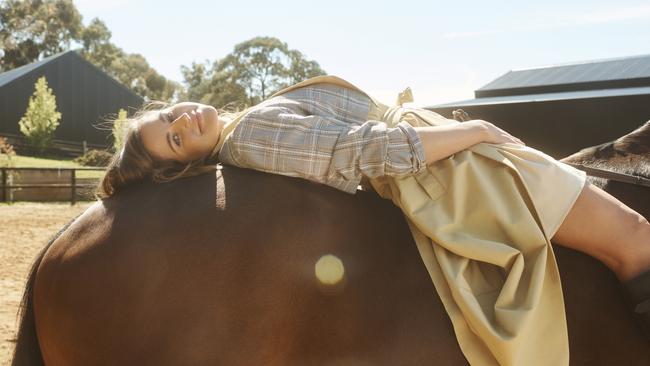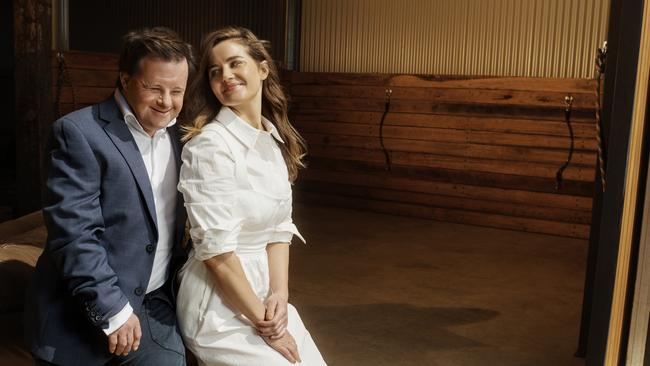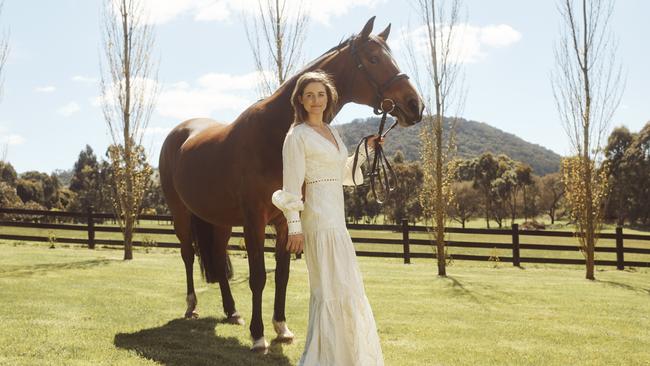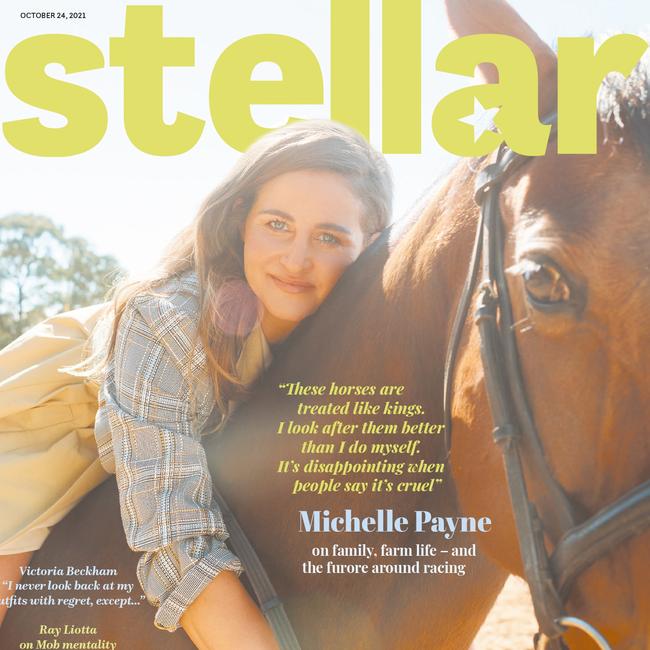Michelle Payne responds to anti-racing protesters
Melbourne Cup-winning jockey Michelle Payne has weighed in on the racing industry’s treatment of horses, arguing animal rights activists only know half the story.
Stellar
Don't miss out on the headlines from Stellar. Followed categories will be added to My News.
Every now and then, usually on a frosty winter morning, Michelle Payne will hear her alarm go off well before sunrise and think, what am I doing?
The horse trainer and jockey’s family – Payne is the youngest of 10 children – have often asked her the same question. They have witnessed the highs, but also the horrendous falls and tumbles that have threatened her very existence and made her a regular resident of hospital wards.
“You’ve won a Melbourne Cup!” they will remind her, before administering the coup de grâce: “Why do you keep going?”
For Payne, who six years ago became the first and only woman to win the historic race, the answer is simple: she loves horses.
“When you get up with the horses – they’re just the most magnificent animals to work with – any doubt you have goes out the window pretty quickly,” she tells Stellar.

“They’re so intuitive. They can read your mood so clearly, whether you’re having a good day or a bad day, and are accepting of it.”
Nevertheless, there was a time, before she had achieved the “ultimate dream” she’d had since she was a child, that Payne contemplated a career change after riding.
“I would have loved to be a nurse. It’s probably from the amount of time I’ve spent in the hospital,” she says with a laugh. “My admiration for what they do is incredible. And I always thought it would be nice to go down that line and give back.”
For now, though, while she is indeed slowly cutting back on her jockey duties, it is only to make her transition into training.
“I recognised that I had to look for something to do after I finished riding; you put your whole life into it. I thought that if I didn’t have some sort of thing to be passionate about after riding, I would get a bit lost,” she explains, before adding, “I wanted to be near Dad and [her older brother] Stevie. Stevie and I own my farm together where I train from, and he works with me every day. It seemed like a natural fit.”
Being on their farm (near the regional Victorian city of Ballarat) and around the horses is not only where the 36-year-old feels most comfortable, it has also helped her cope with the instant global fame that came in 2015 when she rode through that equine glass ceiling on a horse named Prince of Penzance.
“It changed my life in a second and I was not prepared for it at all. I trained my whole life to achieve my ultimate dream of winning the Melbourne Cup. But [I was] never prepared for what would happen after,” she says.

“I joke to my friends that part of my punishment for winning the Melbourne Cup was that I now have to deal with people all the time, and I like my own time. Part of my punishment was the limelight that came with it.”
It was more than just the media attention, a book and ultimately a movie about her life, 2019’s Ride Like A Girl, which starred Teresa Palmer. There was also an endless and intense round of speaking events and conferences, many of which took her overseas.
“I didn’t want to say no. I wanted to experience as many things as I could,” she says.
“But it took a while to adjust. As a jockey you are so conscious of yourself. You’re an athlete, so you have to keep in the best shape. You follow a strict diet and training regimen. And that was all thrown out the window.”
Again, it was those horses that helped her cope. “After the Melbourne Cup, being able to just ride my horse on the farm by myself… it saved my life.”
So did having Stevie by her side. Her brother, who has Down syndrome, was at her side as Prince of Penzance’s strapper on that momentous day at Flemington, and again as she took part in her latest photo shoot with Stellar, not far from their farm.
“People love him. And he loves the limelight! So he takes a lot of pressure off me,” she says, explaining that he originally wasn’t supposed to be strapping Prince that day, but did so at the request of the owners.
“It was meant to be that he was there to show that people with Down syndrome or disabilities can be capable, given the opportunity and the chance. Stevie is amazing. We work together every day. We are a team every day. My dad always says he is a blessing to the family. And he absolutely is.”
Since her win, Payne has noticed a positive change in the attitudes of the powers that be in the racing industry in relation to its treatment of women.
“Women just have a more natural, nurturing approach to connecting with the horses. I’m not saying that men don’t, but I really used to feel with Prince, when I would get on and give him a pat, he knew my voice.
“You could instantly feel him calm underneath you. He had a lot of adrenaline, but as soon as I got on, he relaxed. Riding is so much more than strength, it’s about how that horse travels underneath you,” she says.

“Before there was always this cloud of doubt over women competing at the top level. We were quite often taken off and replaced with the boys because they were stronger. But I can really see a change in people’s mentality. And we’ve had some really amazing talent coming through that have carried on with my success. It gives me goosebumps because it’s been something that I’ve dreamed of my whole career: that [women] would be accepted and given an opportunity.”
In fact, one of Payne’s successors, Jamie Kah, was predicted to be one of the stars of the upcoming Spring Racing Carnival before being suspended for a Covid breach after attending a house party on the Mornington Peninsula. Payne says while it’s unfortunate what happened, she knows Kah will be better for it.
“Being a female and doing so well, she was always going to be in the spotlight, which isn’t easy. But she will learn and at the end of the day, she’ll come back bigger and stronger, I’m sure.”
This year, Payne will be part of Network 10’s racing coverage as well as an ambassador for the Victoria Racing Club.
It’s a role she’s proud to take on, because it allows her to shine a light on horse-rehabilitation programs, such as Rehab4Rehab and Racing Hearts – particularly since the past few years have seen increased attention from animal-rights activists over the industry’s treatment of horses.
But Payne believes the protesters are only seeing one side of the story.
“If they saw these horses every day, they’d see how well cared for and happy they are. They are treated like kings. I look after my horses better than I look after myself,” she says.
“It’s disappointing when people say it’s cruel. I know that’s their perception but if they really knew what was going on behind the scenes they wouldn’t think that.”
As to what the next few years hold, Payne’s aim is to continue what she has started and make the transition to horse training full-time.
“As a jockey, you have to sacrifice your social life to maintain weight and to compete at the top level. But as a trainer, I’m trying to have a bit more of a balance and more of a life,” she says.
“I can get up a little later, at 5.30am, which gives me a little bit more sleep. I’m starting to really work on life balance.”
She also says she wants to start a family. “I would really love to have a family of my own,” she tells Stellar.

“It’s something that I’ve always dreamed of.” But perhaps most importantly, Payne has been able to strike a balance between her love of horses and the world’s love for her.
“My life changed so much six years ago and I was not prepared for that. But nowadays I feel like I’ve adapted to it. I’m really fortunate to have the farm where I can be on my own with the horses, mow the paddock and have some peace,” she says.
“But I do also enjoy the other side of it, of doing things where I can share my story and having people come up to me and say they’ve been inspired by it. I feel like it’s a lot better now than it was and I really enjoy it. It’s good to be in that place.”
For more information on the Melbourne Cup Carnival, which broadcasts live on Network 10, visit vrc.com.au.





